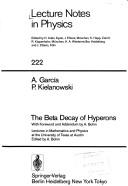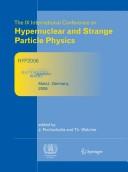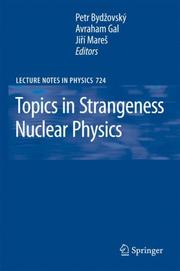| Listing 1 - 7 of 7 |
Sort by
|

ISBN: 0387151842 3540151842 3540392637 9783540151845 Year: 1985 Volume: 222 Publisher: Berlin,New York : Springer-Verlag,
Abstract | Keywords | Export | Availability | Bookmark
 Loading...
Loading...Choose an application
- Reference Manager
- EndNote
- RefWorks (Direct export to RefWorks)
Hyperons --- Beta decay --- Désintégration bêta --- Beta decay. --- Hyperons. --- Désintégration bêta
Book
Abstract | Keywords | Export | Availability | Bookmark
 Loading...
Loading...Choose an application
- Reference Manager
- EndNote
- RefWorks (Direct export to RefWorks)
Natuurkunde --- Physique --- Schilderkunst --- Sciences pures --- Zuivere wetenschappen --- Hypérons --- Hypérons --- Mésons K --- -Mésons K --- -539.7
Book
Year: 1962 Publisher: Bruxelles Presses académiques européennes
Abstract | Keywords | Export | Availability | Bookmark
 Loading...
Loading...Choose an application
- Reference Manager
- EndNote
- RefWorks (Direct export to RefWorks)
Kernfysica --- Sciences pures --- Zuivere wetenschappen --- Hypérons --- 539.7
Book
ISBN: 3540138803 0387138803 3540390774 9783540138808 Year: 1984 Volume: 211 Publisher: Berlin Springer
Abstract | Keywords | Export | Availability | Bookmark
 Loading...
Loading...Choose an application
- Reference Manager
- EndNote
- RefWorks (Direct export to RefWorks)
539.126 <063> --- Mesons. Hyperons--Congressen --- Resonance --- Nuclear magnetic resonance --- Congresses. --- 539.126 <063> Mesons. Hyperons--Congressen

ISBN: 128151277X 9786611512774 3540763678 3540763651 Year: 2007 Publisher: Berlin ; New York : Springer,
Abstract | Keywords | Export | Availability | Bookmark
 Loading...
Loading...Choose an application
- Reference Manager
- EndNote
- RefWorks (Direct export to RefWorks)
This volume contains the proceedings of the IX International Conference on Hypernuclear and Strange Particle Physics (HYP 2006). This conference series, started in 1982, is devoted to the progress of our knowledge about strangeness flavour in hadron and nuclear physics. Besides the traditional topics as hadron structure, hypernuclear spectroscopy and weak decay of hypernuclei, a particular focus of this conference was on the properties of strange mesons and their binding in nuclear systems.
Hyperfragments --- Strange particles --- Decay --- Strangeness (Nuclear physics) --- Particles (Nuclear physics) --- Hypernuclei --- Hyperons --- Nuclear structure

ISBN: 9783540720386 3540720383 9786610960187 1280960183 3540720391 Year: 2007 Publisher: Berlin, Germany ; New York, United States : Springer,
Abstract | Keywords | Export | Availability | Bookmark
 Loading...
Loading...Choose an application
- Reference Manager
- EndNote
- RefWorks (Direct export to RefWorks)
Strangeness nuclear physics bears a broad impact on contemporary physics since it lies at the intersection of nuclear and elementary particle physics, having, moreover, significant implications to the astrophysics of compact objects. This set of extensive lectures presents a balanced theoretical and experimental introduction to, and survey of, the field, addressing topics such as the production and spectroscopy of strange nuclear systems, modern approaches to the hyperon-nucleon interaction, and weak decays of hypernuclei. With new experiments underway, this burgeoning research field is well served by this tutorial primer and review for both newcomers and seasoned researchers alike.
Strange particles --- Hyperons --- Particles (Nuclear physics) --- Particules (Physique nucléaire) --- Congresses. --- Congrès --- Hyperons -- Congresses. --- Particles (Nuclear physics) -- Congresses. --- Strange particles -- Congresses. --- Nuclear Physics --- Electricity & Magnetism --- Physics --- Physical Sciences & Mathematics --- Y-particles --- Strangeness (Nuclear physics) --- Physics. --- Astrophysics. --- Nuclear physics. --- Heavy ions. --- Hadrons. --- Elementary particles (Physics). --- Quantum field theory. --- Particle acceleration. --- Nuclear Physics, Heavy Ions, Hadrons. --- Elementary Particles, Quantum Field Theory. --- Astrophysics and Astroparticles. --- Particle Acceleration and Detection, Beam Physics. --- Baryons --- Heavy particles (Nuclear physics) --- Quantum theory. --- Acceleration (Mechanics) --- Nuclear physics --- Quantum dynamics --- Quantum mechanics --- Quantum physics --- Mechanics --- Thermodynamics --- Atomic nuclei --- Atoms, Nuclei of --- Nucleus of the atom --- Acceleration --- Astronomical physics --- Astronomy --- Cosmic physics --- Relativistic quantum field theory --- Field theory (Physics) --- Quantum theory --- Relativity (Physics) --- Elementary particles (Physics) --- High energy physics --- Nuclear particles --- Nucleons --- Ions
Book
ISBN: 3036554009 3036553991 Year: 2022 Publisher: MDPI - Multidisciplinary Digital Publishing Institute
Abstract | Keywords | Export | Availability | Bookmark
 Loading...
Loading...Choose an application
- Reference Manager
- EndNote
- RefWorks (Direct export to RefWorks)
Following new developments in the measurement of gravitational waves from neutron–star mergers and the modification or construction of particle colliders to reach larger densities, we are entering a new era, during which we can begin to understand dense and hot matter for the first time. This, together with future supernova explosion data, will provide us with the opportunity to have truly multimessenger data on hot and dense matter, which is, to some extent, similar to the matter present in the core of proto-neutron stars. This Special Issue focuses on the theory necessary to understand present and future data. It includes state-of-the-art theoretical models that describe dense and hot matter and dynamical stellar simulations that make use of them, with the ultimate goal of determining which degrees of freedom are relevant under these conditions and how they affect the matter equation of state and stellar evolution.
Research & information: general --- Physics --- neutron stars --- equations of state --- relativistic models --- gravitational waves --- neutron star --- equation of state --- universal relation --- hybrid star --- color superconductivity --- diquark --- dense matter --- neutrinos --- hyperons --- nuclear matter --- neutron star merger --- beta equilibration --- weak interaction --- n/a --- chiral symmetry --- axion QED --- quark–hole pairing --- cold-dense QCD --- magnetic DCDW --- quark stars --- dark matter --- radial oscillations --- nuclear matter aspects --- quark deconfinement --- quark-gluon plasma production --- phase-transition --- neutron star crust --- meson interactions --- quantum molecular dynamics --- quark-hole pairing
| Listing 1 - 7 of 7 |
Sort by
|

 Search
Search Feedback
Feedback About UniCat
About UniCat  Help
Help News
News